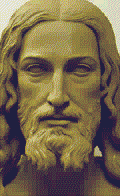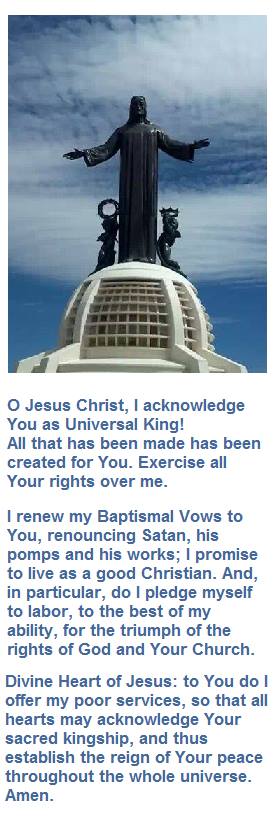Confession is the easiest sacrament for us to receive, it is available to everyone and it does not require difficult conditions. Therefore, anyone willing to make a good Confession will always achieve their objective. Hence, those who are greatly afraid of making a bad Confession tend to make the best ones, due to this very fear.
Disciple: Should we pray before we go to Confession?
Master: It is a matter of faith that without the aid of divine grace we cannot make a good Confession. We must ask for this aid through prayer before the examination of conscience, and so we should:
1) Revive the faith in this sacrament, which is the principal means of salvation.
2) Greatly thank Jesus, who wanted to give us such a great gift, at the expense of His passion and death.
3) Entrust ourselves to Our Blessed Mother, who is Refuge of sinners, to our Guardian Angel and to the souls in purgatory; once we have done this we should examine our consciences.
D.- Oh, Father, it is at this point where my worries start. I am not capable of making a good examination of conscience… either I cannot remember my sins or I forget them when I am in front of the confessor.
M.- Slow down, my friend, slow down, let us not muddy the waters with an excessive zeal. Fear will never help us to achieve anything; however, if we try to proceed with calm and trust in God, we will certainly get what we want. Let us do our part and God will take care of the rest. Normally, the less satisfied we are, the more satisfied He is.
It is compulsory to make a serious (deep) and thorough examination for everyone who:
1) Commits mortal sins.
2) Goes to Confession very occasionally.
3) Has not made a good Confession in a long time.
These persons must confess their grave sins along with the circumstances that modify the type of sin, also the number of times they committed each, and, of course, they have to examine their conscience seriously and carefully in advance.
D.- What do we have to do to make a good examination of conscience?
M.- In order to examine thoroughly our consciences we have to consider one by one the Commandments of God and of the Church, together with one’s duties of state; examining if we have failed, and how many times, in thoughts, words, deeds or omissions, taking into account our ruling passion and the cause of our most ordinary faults.
In the First Commandment, we should examine if we have sinned against faith in any of the truths of our sacrosanct religion; if we have uttered or heard words; read books, journals or newspapers contrary to religion; if we have committed sacrileges, either by making bad Confessions or by receiving Communion sacrilegiously, or by showing contempt towards sacred persons or things; if we have engaged in superstitious practices or taken part in spiritualist acts.
In the Second Commandment, we should examine if we have blasphemed the Holy Name of God, the Blessed Virgin Mary, the saints or sacred things, and if we have taken false or unlawful oaths.
In the Third Commandment, we should examine if we have attended Mass properly on Sundays and Holy Days of Obligation; if we have not listened to the sermons on purpose or have not attended catechism lessons; if we have engaged in servile works or if we have profaned the festivals engaging in illicit or dangerous distractions, this is to say, indulging in dissipation, or spending the day in taverns, clubs or dangerous places.
In the Fourth Commandment, we should examine if we have been disrespectful towards our parents or superiors, by word or by deed, if we have insulted them; if we have hit them or made them cry due to our bad behavior.
In the Fifth Commandment, we should examine if we have wounded somebody seriously; if we have sworn vengeance; if we have uttered imprecations or curses; if we have given scandal, that is to say, if we have induced other people to sin with our words or deeds.
In the Sixth and Ninth Commandments, we should examine if we have had thoughts or actions contrary to chastity, and if we have willfully entertained in them instead of discarding them immediately; if we have had or listened to impure conversations or if we have read immodest books; if we have committed impure actions alone or with others and if so, the nature, gender and status of those involved in such acts, since these circumstances modify the malice of the sin; if we commit them occasionally or if they have become a habit; and if we have frequented immodest places of dance or shows.
In the Seventh and Tenth Commandment, we should examine if we have stolen money or things of significant value, either from homes or from other people; if we have wronged our neighbor in their property; if we have desired in thought to take what is not ours.
In the Eighth Commandment, we should examine if we have told serious or harmful lies about our neighbor; if we have slandered or libeled someone; or if we have harmed others by telling lies against their honor or good name.
Moving on now to the Commandments of the Church, it is sufficient to examine if we have eaten meat on forbidden days and if we have not fasted, in case we are obliged to do it, or if we have not confessed our sins and received Holy Communion once a year during prescribed time.
We should add to the previous examination something related to vices and deadly sins, examining if we have committed serious sins of pride, gluttony, wrath and envy.
Finally, we should take a look at our obligations related to our duty of state.
D.- Should we also examine ourselves about the obligations of our duty of state?
R.- Of course! A father or a mother, a husband or a wife, a teacher, a superior or a clerk may observe diligently all the Commandments of God and of the Church, yet fail gravely in their duties of state; therefore, it is of the utmost importance to examine ourselves about it, if we wish to make a good Confession. The following anecdote is true:
During one of his trips, the emperor Charles the V lodged in a convent and wanted to make a Confession. A very kind and venerable religious listened intently to the emperor’s confession, and once he had finished, he told him: “Confessus es pecenta Caroli, nunc confitere peccata Caesarin”. You have confessed the sins committed by Charles, that is to say, as if you were not the emperor, now you should confess all the sins you have committed in the position you occupy. And with great ability and sagacity he began to interrogate him about how he ruled his people. The emperor was so moved that later on he said: “I have finally found a Father who has explained to me certain issues and has given full peace to my conscience.”
D.- Father, is it possible for everyone to make a perfect and diligent examination?
M.- If we do not succeed in making such an examination, it will suffice if we go to the confessor, willing to tell him everything we remember and to answer honestly the questions he asks us.
D.- But what happens if the confessor does not ask us and we forget to tell him some mortal sins?
M.- All sins, even mortal sins that we unintentionally forget, are forgiven together with the ones that we do confess, remaining only the obligation to confess them, if we remember them, in the next Confession we make.
D.- Do we also have to examine our thoughts and desires?
M.- Yes, of course, because thoughts and desires, if impure or evil, are also sins.
One time a candid child said to his mother: If what you have told me that nothing gets lost in the world is true, then where do thoughts and desires go?
- Son, said the mother, seriously, those deposit in the mind of God and remain there forever.
- Forever!, exclaimed the child, shocked.
For a while, he was thoughtful and a bit reflective, and then hugging his mother closely he said to her:
- I am scared!
If our thoughts are good, why would we be scared? But if certain thoughts make us feel afraid, it is a clear sign that we should examine them and abhor them.
D- Are bad thoughts always sins?
M.- No, my friend. Sometimes bad thoughts are not sins at all, other times they are venial sins, however, they can also be mortal sins. The next example will help clarify what we are saying:
If a spark of fire falls on a white cloth but we remove it immediately it does not leave a stain. If we leave it there for a brief instant, it will leave a blackened smear.
However, if we leave it there to see what happens, it will burn the cloth completely. The same happens with bad thoughts, if we discard them immediately, they do not cause any harm at all, if we entertain for an instant in them, they become venial sins, and if we indulge in them with full knowledge and consent, they become mortal sins.
D.- Who is not obliged to make a thorough (deep) examination of conscience?
M.- Timorous souls, who in addition confess frequently, are in no way obliged to make a thorough examination, the reason being that either they do not commit mortal sins, or having committed one they do not forget it easily (since they are recent sins. If they remember all of them, then it will not be necessary a deep examination).
D.- Now, Father, tell me, are those who anguish and agitate because they cannot find any sins at all acting wrong?
M.-Most probably yes. What is so wonderful about not finding any sins because they do not commit them? They should thank God and carry on without committing them with the powerful aid of the sacraments… sins, if not committed, cannot be found.
CONFESS WELL!
Fr. Luis José Chiavarino

























.jpeg)










